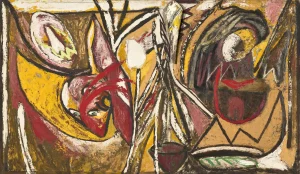The art world witnessed a significant milestone as a Swiss auction house completed the first-ever sale of an artwork authenticated solely through artificial intelligence technology.
Breaking new ground: Germann Auction House in Zürich partnered with AI authentication company Art Recognition to validate and sell a watercolor by Russian artist Marianne von Werefkin.
- The watercolor sold for nearly $17,000, exceeding its high estimate of $9,000 by almost double
- Two additional works at the same auction were authenticated using both AI and traditional human expertise
- The additional pieces, works by Louise Bourgeois and Mimmi Paladino, sold for $31,500 and $21,500 respectively

Technical process and pricing: Art Recognition employs a specialized AI system that evaluates artwork authenticity with minimal human intervention beyond initial dataset curation.
- The company offers two authentication tiers: a premium service providing percentage probability of authenticity and a basic service offering simple genuine/not genuine verification
- Authentication services typically cost around $2,200 per piece, with discounts available for bulk submissions
- The system recommends additional expert consultation when authenticity probability falls below 80%
Industry perspective: The groundbreaking sale has generated mixed reactions from art world professionals and experts.
- Fabio Sidler, auctioneer at Germann, expressed confidence in the AI system’s accuracy while acknowledging potential criticism
- The anonymous winning bidder praised AI’s pattern recognition capabilities and emphasized the importance of market acceptance
- British art historian Bendor Grosvenor cautioned that AI’s track record in art authentication remains “patchy”
Market implications: The successful sale could signal a shift in how the art market approaches authentication methods.
- Art Recognition CEO Carina Popovici suggests this marks a significant change from traditional reliance on human connoisseurs
- The company maintains that AI authentication works best in conjunction with human expertise, particularly for complex cases
- The art market’s acceptance of AI authentication could influence future sales and validation processes
Future outlook: While this sale represents a milestone for AI in the art world, questions remain about the technology’s role in authentication.
- The success of this sale may encourage other auction houses and dealers to incorporate AI authentication
- The art market’s traditional preference for human expertise and technical analysis suggests a gradual rather than immediate transition
- The balance between technological innovation and traditional authentication methods will likely continue to evolve as AI capabilities advance
Recent Stories
DOE fusion roadmap targets 2030s commercial deployment as AI drives $9B investment
The Department of Energy has released a new roadmap targeting commercial-scale fusion power deployment by the mid-2030s, though the plan lacks specific funding commitments and relies on scientific breakthroughs that have eluded researchers for decades. The strategy emphasizes public-private partnerships and positions AI as both a research tool and motivation for developing fusion energy to meet data centers' growing electricity demands. The big picture: The DOE's roadmap aims to "deliver the public infrastructure that supports the fusion private sector scale up in the 2030s," but acknowledges it cannot commit to specific funding levels and remains subject to Congressional appropriations. Why...
Oct 17, 2025Tying it all together: Credo’s purple cables power the $4B AI data center boom
Credo, a Silicon Valley semiconductor company specializing in data center cables and chips, has seen its stock price more than double this year to $143.61, following a 245% surge in 2024. The company's signature purple cables, which cost between $300-$500 each, have become essential infrastructure for AI data centers, positioning Credo to capitalize on the trillion-dollar AI infrastructure expansion as hyperscalers like Amazon, Microsoft, and Elon Musk's xAI rapidly build out massive computing facilities. What you should know: Credo's active electrical cables (AECs) are becoming indispensable for connecting the massive GPU clusters required for AI training and inference. The company...
Oct 17, 2025Vatican launches Latin American AI network for human development
The Vatican hosted a two-day conference bringing together 50 global experts to explore how artificial intelligence can advance peace, social justice, and human development. The event launched the Latin American AI Network for Integral Human Development and established principles for ethical AI governance that prioritize human dignity over technological advancement. What you should know: The Pontifical Academy of Social Sciences, the Vatican's research body for social issues, organized the "Digital Rerum Novarum" conference on October 16-17, combining academic research with practical AI applications. Participants included leading experts from MIT, Microsoft, Columbia University, the UN, and major European institutions. The conference...
